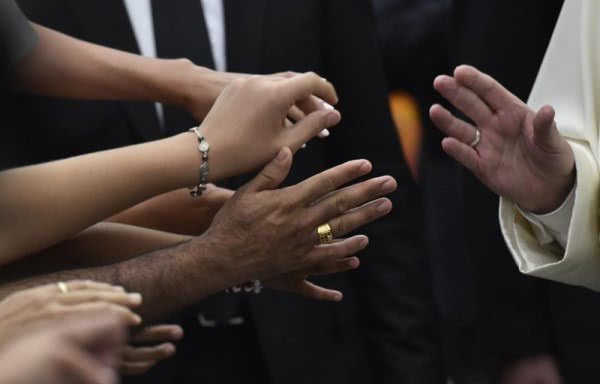Dear brothers and sisters, good morning!
Let us continue today to meditate on the Decalogue, looking more closely at the theme of idolatry: we spoke about it last week. Now we will take up the theme again as it is very important to know about it. Let us take our cue from the quintessential idol, the golden calf, mentioned in the Book of Exodus (32: 1-8) – we have just heard a passage. This episode has a precise context: the desert, where the people await Moses, who climbed the mountain to receive instructions from God.
What is the desert? It is a place where precariousness and insecurity reign – in the desert there is nothing – where water is lacking, food is lacking, and shelter is lacking. The desert is an image of human life, whose condition is uncertain and has no inviolable guarantees. This insecurity generates in man primary anxieties, which Jesus mentions in the Gospel: “What shall we eat? What shall we drink? What shall we wear?” (Mt 6:31). They are the primary concerns, and the desert provokes these concerns.
And in that desert something happens that triggers idolatry: “Moses was so long in coming down from the mountain” (Ex 32: 1). He stayed there for forty days and the people grew impatient. The reference point, who was Moses, is missing: the leader the head, the reassuring guide, and this becomes unsustainable. Then the people ask for a visible god to be able to identify and orientate themselves. And they say to Aaron: “Come, make us gods who will go before us! Make us a head, make us a leader!” Human nature, to escape from precariousness – the precariousness of the desert – seeks a “do-it-yourself” religion: if God does not show Himself, we make ourselves a made-to-measure god. “Before an idol, there is no risk that we will be called to abandon our security, for idols ‘have mouths, but they cannot speak’ (Ps 115: 5). Idols exist, we begin to see, as a pretext for setting ourselves at the centre of reality and worshipping the work of our own hands” (Encyclical Lumen fidei, 13).
Aronne can not oppose the people’s requests, and he creates a golden calf. The calf had a twofold meaning in the ancient Near East: on the one hand it represented fruitfulness and abundance, and on the other it represented energy and strength. But above all it is golden, so it is a symbol of wealth, success, power and money. These are the great idols: success, power and money. These are the temptations of all time! Here is what the golden calf is: the symbol of all the desires that give the illusion of freedom, and instead enslave, because the idol always enslaves. It is appealing, and you go. That charm of the snake, who looks at the little bird and the bird stays there, without being able to move, and the snake takes him. Aaron did not know how to resist it.
But everything stems from the inability to trust above all in God, to place our safety in Him, to let Him give true depth to our heart’s desires. This also allows us to bear weakness, uncertainty and insecurity. Reference to God makes us strong in weakness, uncertainty and even in precariousness. Without God’s primacy one easily falls into idolatry and settles for meagre assurances. But this is a temptation we always read in the Bible. And think carefully about this: freeing the people from Egypt did not cost God much work; He did so with a sign of power, of love. But the great work of God was removing Egypt from the heart of the people, that is, removing idolatry from the heart of the people. And God still continues to work to remove it from our hearts. This is God’s great task: removing “the Egypt” that we carry within ourselves, that is the fascination of idolatry.
When we welcome the God of Jesus Christ, who made Himself poor for us (cf. 2 Cor 8: 9), we discover that recognizing our weakness is not the misfortune of human life, but it is the condition for opening up to He Who is truly strong. Then God’s salvation enters through the door of weakness (cf. 2 Cor 12:10): it is because of his own insufficiency that man opens himself to the fatherhood of God. Man’s freedom arises from letting the true God be the only Lord. This allows us to accept our own fragility and reject the idols of our hearts.
We Christians turn our gaze to Christ crucified (cf. Jn 19:37), Who is weak, despised and stripped of all possession. But in Him the face of the true God is revealed, the glory of love and not that of glittering deception. Isaiah says: “By his wounds we are healed” (53: 5). We have been healed precisely by the weakness of a man Who was God, by His wounds. And from our weakness, we can open ourselves up to God’s salvation. Our healing comes from He Who became poor, Who accepted failure, Who took our precariousness to its limit so as to fill it with love and strength. He comes to reveal to us the fatherhood of God; in Christ our fragility is no longer a curse, but a place of encounter with the Father and the source of a new force from above.
